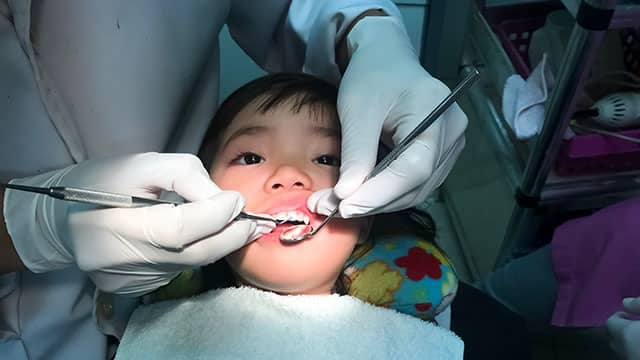What is Palate Cancer?
Palate cancer is a carcinoma on the roof of the mouth. Most cancer of the palate is considered squamous cell carcinomas. It usually appears first as an ulcer, which then develops further.
According to the American Cancer Society, 90 percent of all oral and oropharynx ( the back part of the mouth) cancers are squamous cell carcinomas. Squamous cell carcinomas are a type of cancer that affects the skin and tissues' top and mid-level layers. This means that palate-based cancer usually starts on the surface of the tissues.
Squamous cell carcinomas can grow quickly, so if you notice scaly bumps or small tumors on the roof of your mouth, it's essential to talk to your health care provider immediately. Less than 5 percent of oral cancers are verrucous carcinomas, which grow slowly but can penetrate deeper layers of skin and spread to other areas.
Types of Palate Cancer
Palate cancer is of two types – hard palate cancer and soft palate cancer.
Hard Palate Cancer begins in the bony part on the roof of the mouth. Although it's located in the front part of the mouth, it's actually considered a cancer of the head and neck.
Soft Palate Cancer starts in the soft palate cells, which are on the upper portion of the back of your mouth, right behind your teeth. Unlike hard palate cancer, soft palate cancer is a type of throat cancer.
Palate Cancer Signs and Symptoms
Catching any signs or symptoms early on and getting them checked out right away is the key to ensuring the most positive outcome. Let's go over some signs and symptoms, so you know what to look out for.
The most common sign of hard palate cancer is usually the appearance of an ulcer on the roof of the mouth. As it grows, the ulcer may start bleeding. Dentists and dental hygienists are usually the first to notice the beginning signs of hard palate cancer during their routine exams. So, make sure you get a dental examination regularly!
Other hard palate cancer symptoms can include:
- Bad breath
- Loose teeth or pain around your teeth
- Dentures that no longer fit
- Speech changes
- Difficulty swallowing or moving your jaw
- A lump in your neck
Soft palate cancer has some similar signs and symptoms, which can include the following:
- Bad breath
- Loose teeth
- Bleeding
- Difficulty swallowing or speaking
- Pain when swallowing
- Mouth pain and/or sores that don't heal
- Weight loss
- Ear pain
- Swelling in your neck that may hurt
Anytime you have symptoms in your mouth that don't resolve in two weeks, it's time to talk to your health care provider or dental professional!
Palate Cancer Risk Factors
Oral cancers are usually the result of lifestyle and habits, and palate cancer is no different. The following are some of the risk factors that can lead to palate cancer:
- Tobacco use
- Drinking alcohol
- Being infected with human papillomavirus (HPV)
- Medications that suppress your immune system
- Being older than 40
- Poor diet
The best way to stay healthy is to prevent disease in the first place. Avoiding or limiting tobacco and alcohol, eating healthy, and receiving an HPV vaccine are great ways to protect yourself proactively!
Treatment Options
If treatment is needed for palate cancer, there are plenty of options out there. Like other oral cancers, early detection is the key to ensuring that palate cancer is addressed quickly. Doing so will increase your chances for success and ensure that its removal does the least damage to the surrounding tissue.
Hard palate cancer is highly curable when found and diagnosed as early as possible. When this is the case, treatment often involves surgery performed by a head and neck cancer surgeon. If things advance, chemotherapy, radiation, or a combination of them is used to shrink the tumor (either before or after surgery). In some instances, radiation may be the only treatment needed.
Soft palate cancer treatment depends on many factors, like the size and location of the cancer. Treatment can include surgery, radiation, chemotherapy, and reconstructive surgery. Rehabilitative services (for swallowing, speech, etc.) and palliative care (to relieve the pain or symptoms of other affected areas) may also be needed. If the tumor is small, surgery can be done without an overnight stay at the hospital. If the cancer is bigger, then more extensive surgery is required.
Now you have all the essential information about palate cancer. You know what signs to look out for, like ulcers or bad breath. And you know that if any oral symptoms last for more than two weeks, that you need to let your dentist know right away. Remember, preventing palate cancer is easier than treating it. So, avoiding risk factors like using tobacco helps. Lastly, early detection is always best as it tends to limit the scope of treatment and the damage caused by repair. Stay on top of your dental care and if you have any concerns about symptoms in your mouth, call your dental professional right away.
This article is intended to promote understanding of and knowledge about general oral health topics. It is not intended to be a substitute for professional advice, diagnosis or treatment. Always seek the advice of your dentist or other qualified healthcare provider with any questions you may have regarding a medical condition or treatment.
ORAL HEALTH QUIZ
What's behind your smile?
Take our Oral Health assessment to get the most from your oral care routine
ORAL HEALTH QUIZ
What's behind your smile?
Take our Oral Health assessment to get the most from your oral care routine















